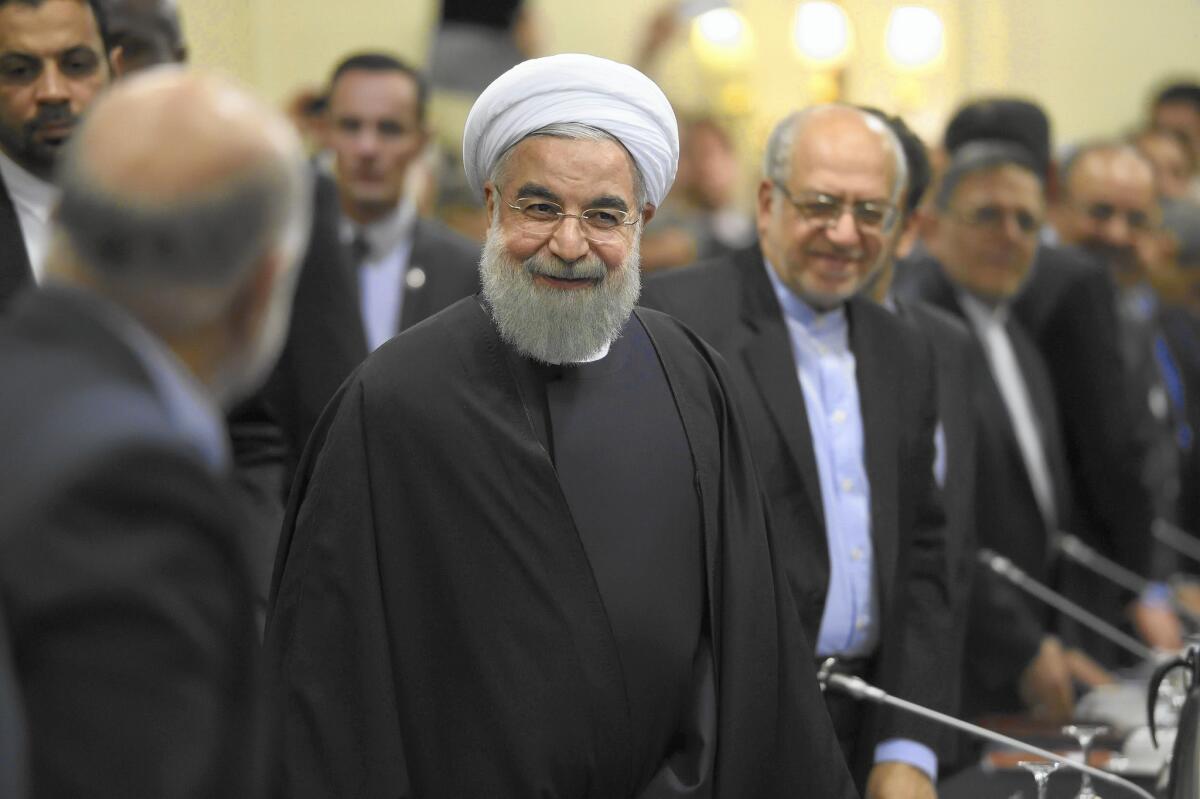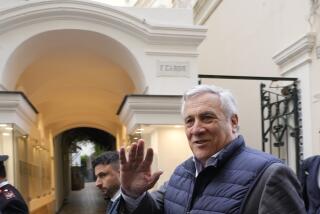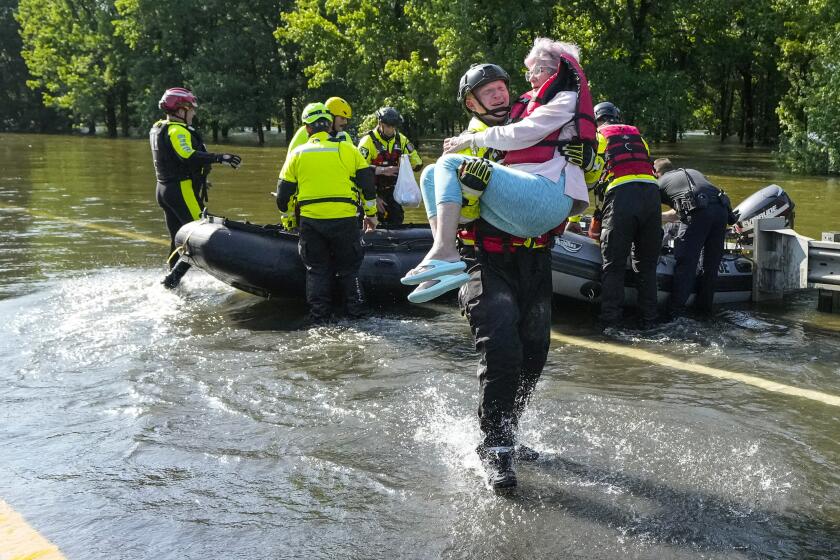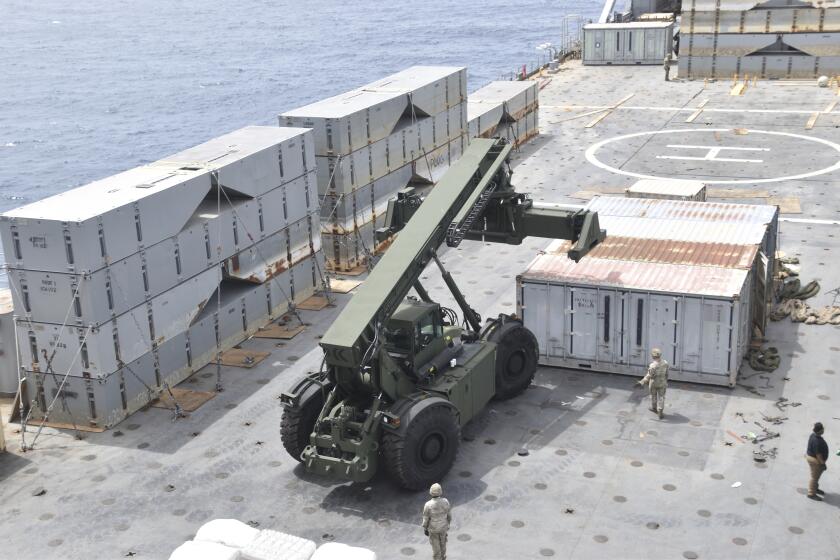Iranian President Hassan Rouhani in Paris to court investors

Iranian President Hassan Rouhani arrived in Paris on Wednesday on the second leg of a whirlwind tour promoting his country’s opening to the world economy now that nuclear-related sanctions have been lifted.
“We don’t see any obstacles for companies that would want to come and invest in Iran,” Rouhani, speaking through an interpreter, told a delegation of French business leaders. “Iran is ready for investments.”
After arriving from Rome, Rouhani and Iranian Foreign Minister Mohammad Javad Zarif met with French Foreign Minister Laurent Fabius and Economy Minister Emmanuel Macron. Rouhani then hosted leaders of France’s business community in his Paris hotel.
France is the second and final stop on Rouhani’s four-day trip to Europe on a mission to bolster European investment in the Islamic Republic after years of international penalties have throttled the Iranian economy.
Nuclear-related sanctions against Iran were lifted Jan. 16. That was after the United Nations’ nuclear watchdog agency certified that Iran had complied with its vow to constrain its atomic activities in line with an agreement reached with six world powers, including the United States.
Iran has always insisted that its nuclear program was purely for peaceful purposes, despite suspicions in the West and Israel that Tehran was seeking to build an atomic bomb. U.S. officials say the new deal makes it much less likely that Iran could build a bomb.
Rouhani, who has staked his presidency on improving Iran’s battered economy and attracting foreign investment, has hailed the end of sanctions as a beginning of a new economic era for Iran.
In France, Iranian officials have indicated they are on the verge of signing a multibillion-dollar deal with Airbus, the aircraft manufacturer. Auto manufacturers Peugeot and Renault may also be in line for deals, according to reports, and oil giant Total has also been linked to possible Iranian business contracts.
Rouhani was also expected to meet with French President Francois Hollande during his visit.
Iran has already signaled its intention to purchase 114 Airbus passenger jets in a bid to modernize the nation’s aging fleet, which has suffered from lack of new aircraft and spare parts.
The Iranian president’s swing through Rome included a private meeting with Pope Francis — the first encounter in 16 years between a pontiff and an Iranian leader. Rouhani also sat down with sundry business leaders.
While Rouhani was in Italy, the Iranian press reported, contracts worth $17 billion were inked between Iran and Italian companies.
Italy and France put on a warm welcome for Rouhani, dramatizing Europe’s desire to get in on what many see as a business bonanza after the lifting of sanctions.
The Italy leg of the trip drew some controversy when a Rome museum covered up statues of naked figures in an apparent deference to Rouhani, a Shiite Muslim cleric.
Italian Culture Minister Dario Franceschini later labeled the action “incomprehensible.” He said neither he nor Prime Minister Matteo Renzi had been informed beforehand of the plan to cover up the statues.
Rouhani’s reception in France appeared slightly more low key than in Italy, a reflection perhaps of France’s close ties to Saudi Arabia, Tehran’s regional rival, and Paris’ robust backing of efforts to oust Syrian President Bashar Assad, a close ally of Iran. Tehran has provided military and economic aid to Assad’s government, which has been fighting a five-year war against insurgents.
“It’s true that Iran has returned to the international community,” Fabius said Wednesday. “But it doesn’t mean we agree on everything, especially on Syria.”
For months, foreign business delegations from Europe and Asia have been beating a path to Tehran, anticipating that the lifting of sanctions would open up a raft of opportunities to do business with the nation of 80 million.
Absent in the rush to do business with Iran are U.S. firms and corporations. Most U.S. sanctions remain in place, making it difficult for American companies to conduct commerce in Iran.
Despite the business frenzy, there is still residual hesitancy on the part of some companies to dive headlong into Iran investments.
Some corporate executives fear the nuclear accord’s so-called snapback provisions, which would swiftly restore sanctions if Iran is found to have violated the terms of the deal. Those seeking to invest in Iran also face an antiquated and complex internal financing and banking system, another daunting hurdle.
Still, analysts say Iran — with a highly educated population, huge oil and gas reserves and a strategic position in the Middle East — represents attractive business terrain.
The business deals being signed in Europe represent a clear victory for Rouhani, who was elected in 2013 on a platform of ending sanctions and opening up to the West as means of dragging Iran out of its economic malaise of high unemployment, rising prices and a faltering currency. Rouhani’s surprising landslide victory was a rebuke of hard-liners who rejected any overtures to the West and downplayed the effects of sanctions.
Still, Rouhani and other moderates face considerable political challenges in Iran from conservatives opposed to his policies. Hard-line critics in Iran fear that economic liberalization could lead to increased political and cultural influence in the Islamic Republic, weakening power elites such as the Revolutionary Guard Corps, a military and economic power in the country.
Despite stiff internal opposition, Rouhani has remained consistent in his vow to boost Iran’s economy and complete a nuclear deal with world powers.
Two years ago, during a visit to the World Economic Forum in Davos, Switzerland, Rouhani told world leaders that Iran “was open for business.” With sanctions lifted, Rouhani seems determined to follow up on his desire to attract international investors and businesses to Iran.
Asian companies and nations have also been eyeing Iran for business opportunities in a post-sanctions environment.
Last week, Chinese President Xi Jinping capped a three-nation tour of the Mideast with a visit to Tehran, where he signed accords on an array of trade, energy and other topics, officials said. He was the first Chinese president to visit Iran in 14 years.
Times staff writer McDonnell reported from Paris and special correspondent Mostaghim from Tehran.
MORE ON THE MIDDLE EAST
Can Iran deliver on promises to ramp up oil production?
Iranian leader, saying nation ‘stable and safe,’ meets pope
On eve of peace talks, Syrian forces make fresh gains against rebels
More to Read
Start your day right
Sign up for Essential California for news, features and recommendations from the L.A. Times and beyond in your inbox six days a week.
You may occasionally receive promotional content from the Los Angeles Times.






